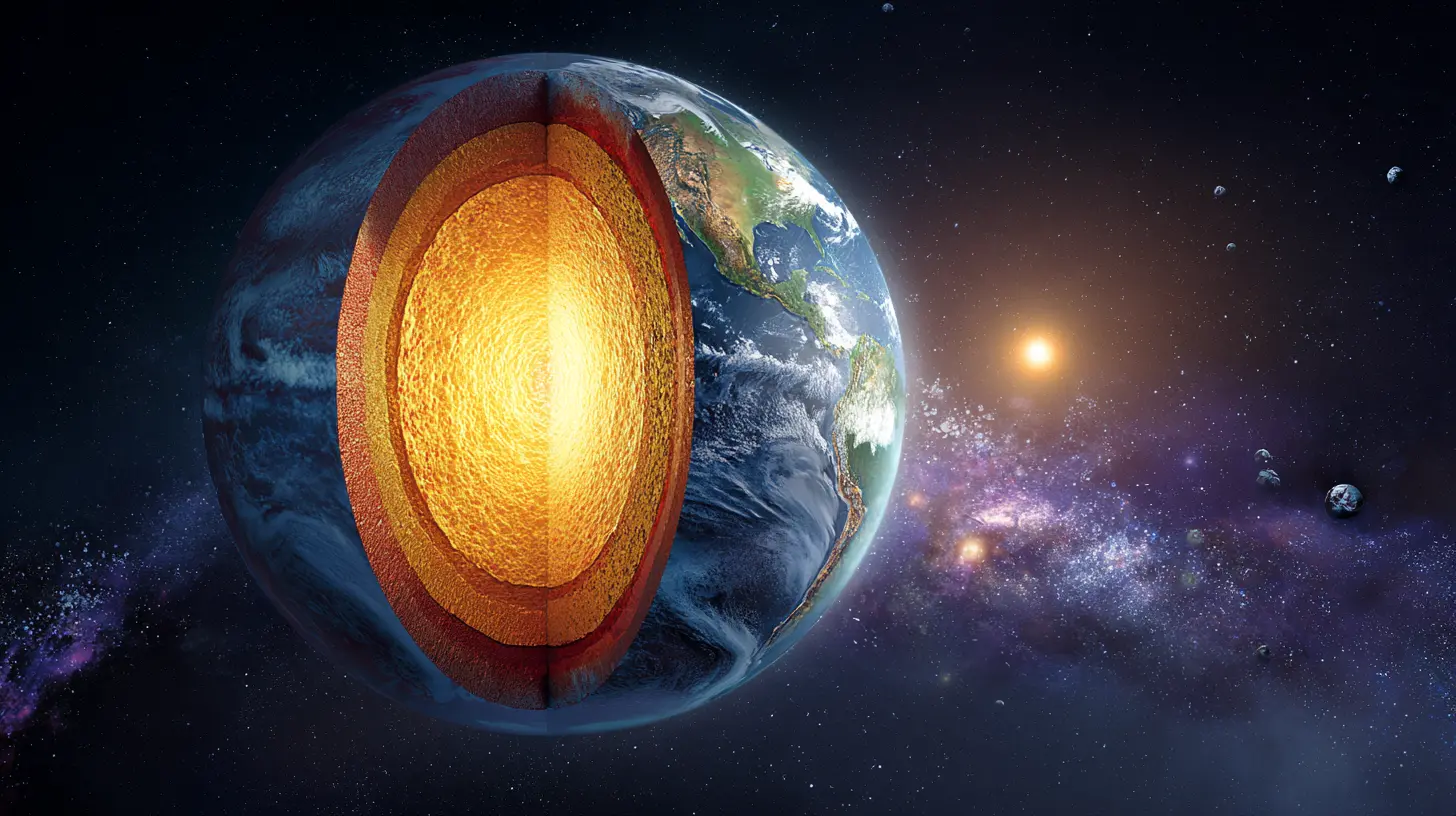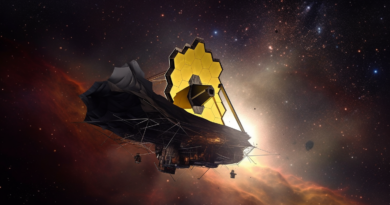Vídeo | Everything You Need to Know About Planet Earth
Descubra a fascinante história do planeta que chamamos de lar! Desde sua violenta formação há 4,6 bilhões de anos até a criação da Lua por um impacto colossal, mergulhe nos mistérios da Terra: sua fina crosta cheia de vida, o núcleo incandescente, os vastos oceanos, as placas tectônicas em movimento e o campo magnético que nos protege. Este vídeo revela como a combinação única de elementos, água e atmosfera moldou um planeta extraordinário, permitindo o surgimento da vida em meio à imensidão do cosmos. Afinal, o que torna a Terra tão especial?
| Audio | |
|---|---|
Normal | Slow |
| English Transcript | Tradução |
| Everything You Need to Know About Planet Earth | Tudo o que Você Precisa Saber Sobre o Planeta Terra |
| Planet Earth is the home of every life form known to us in the universe. | O planeta Terra é o lar de todas as formas de vida conhecidas por nós no universo. |
| Its age is about one-third that of the universe and, admittedly, it is a thing of beauty. | Sua idade é de cerca de um terço da idade do universo e, admitidamente, é uma maravilha de beleza. |
| A slightly squashed sphere with a heavy metal core and a lighter surface crust, it is wrapped in a thin sliver of sweet air to breathe, with vast oceans, fertile plains, magnificent mountains, freshwater rivers, streams, lakes, and aquifers. | Uma esfera levemente achatada, com um núcleo pesado de metal e uma crosta de superfície mais leve, envolve-se em uma fina camada de ar doce para respirarmos, adornada com vastos oceanos, planícies férteis, montanhas magníficas, rios de água doce, córregos, lagos e aquíferos. |
| It orbits a star that warms us and gives us energy. | Ela orbita uma estrela que nos aquece e nos fornece energia. |
| But how did our home come into existence, and what is it made of? | Mas como o nosso lar surgiu, e do que ele é feito? |
| 4.6 billion years ago, Earth was created from the remnants of dead stars, which had collected in a giant, dusty gas cloud. | Há cerca de 4,6 bilhões de anos, a Terra foi formada a partir dos restos de estrelas mortas, que se reuniram em uma gigantesca nuvem de gás e poeira. |
| The gas cloud became denser at its center and formed an accretion disk. | Essa nuvem de gás ficou mais densa no centro e formou um disco de acreção. |
| Small particles started clumping together, building larger and larger objects until they formed the bodies we call "planets" today. | Pequenas partículas começaram a se agrupar, formando objetos cada vez maiores, até que se tornaram os corpos que hoje chamamos de "planetas". |
| This process took 10 to 20 million years and is still not very well understood. | Esse processo levou entre 10 e 20 milhões de anos e ainda não é completamente compreendido. |
| At about this time, when the solar system was young and chaotic, a giant object about the size of Mars collided with what would become Earth. | Por volta desse período, quando o sistema solar era jovem e caótico, um gigantesco objeto, do tamanho aproximado de Marte, colidiu com o que viria a ser a Terra. |
| The impact was violent, and if the object had been more massive, it might have destroyed our planet. | O impacto foi violento, e, se o objeto fosse mais massivo, poderia ter destruído o planeta. |
| Materials from Earth were launched into orbit and coalesced to form the Moon, which is the largest satellite in relation to its planet in the solar system. | Materiais da Terra foram lançados para a órbita e se uniram para formar a Lua, o maior satélite em proporção ao seu planeta no sistema solar. |
| At this time, Earth was a hot, hellish world, constantly bombarded by asteroids, with seas of lava and a toxic atmosphere. | Nesse estágio, a Terra era um mundo quente e infernal, constantemente bombardeado por asteroides, com mares de lava e uma atmosfera tóxica. |
| But something was about to change drastically. | Mas algo estava prestes a mudar drasticamente. |
| Earth eventually cooled down. | A Terra eventualmente resfriou. |
| Water from within the planet migrated to the surface and rained down, only to evaporate again and form clouds. | A água de dentro do planeta migrou para a superfície e caiu em forma de chuva, apenas para evaporar novamente e formar nuvens. |
| Millions of asteroids brought even more water to our planet. | Milhões de asteroides trouxeram ainda mais água ao nosso planeta. |
| Today, the surface of Earth consists of 71% water and 29% land. | Hoje, a superfície da Terra é composta por 71% de água e 29% de terra. |
| Of all this water, 97.5% is saline, while only 2.5% is freshwater. | De toda essa água, 97,5% é salgada, enquanto apenas 2,5% é água doce. |
| Of the freshwater, 69% is ice and snow, 30% is underground water, and only about 1% makes up the remaining surface water. | Dessa água doce, 69% estão em forma de gelo e neve, 30% são águas subterrâneas, e apenas cerca de 1% corresponde à água restante em superfícies. |
| Even this small percentage is mostly frozen. | Mesmo essa pequena fração é, na maior parte, congelada. |
| Only a tiny fraction of this freshwater exists as liquid in lakes and rivers, and an even smaller portion is bound within living organisms. | Apenas uma porção minúscula dessa água doce existe em lagos e rios, e uma parte ainda menor está presente nos seres vivos. |
| Gradually, Earth’s surface cooled further, forming a thin crust. | Gradualmente, a superfície da Terra resfriou ainda mais, formando uma fina crosta. |
| However, inside the planet, hot rock continues to swirl about, moving the crust from below and breaking it apart. | No entanto, dentro do planeta, rochas derretidas continuam a girar, movendo a crosta de baixo para cima e rompendo-a. |
| This process, called "plate tectonics," is still happening today. | Esse processo, chamado "tectônica de placas", ainda ocorre nos dias de hoje. |
| Earth's crust consists of massive, separate plates that move around. | A crosta da Terra é formada por grandes placas separadas que se movimentam. |
| As they meet, they either crumble to form mighty mountains, or violently plunge back into the deeper layers of Earth, creating deep trenches. | Quando essas placas se encontram, elas ou se dobram, formando montanhas enormes, ou se submergem violentamente nas camadas mais profundas da Terra, criando trincheiras profundas. |
| That is how the highest point on Earth, Mount Everest, and the deepest point, the Mariana Trench, were formed. | Foi assim que o ponto mais alto da Terra, o Monte Everest, e o ponto mais profundo, a Fossa das Marianas, se formaram. |
| From our perspective, Earth's mountains and trenches are immense. | Da nossa perspectiva, as montanhas e trincheiras da Terra são imensas. |
| But when seen in cross-section, they are surprisingly tiny. | Mas, quando vistas em corte transversal, são surpreendentemente pequenas. |
| The layer we live on, the crust, is about 50 kilometers thick on average, though it varies between 5 and 70 kilometers. | A camada sobre a qual vivemos, a crosta, possui cerca de 50 quilômetros de espessura, em média, embora varie entre 5 e 70 quilômetros. |
| For comparison, the deepest hole ever drilled by humans reached only 12.262 kilometers into the Earth. | Para comparação, o buraco mais profundo já perfurado pelo ser humano alcançou apenas 12.262 quilômetros. |
| Beneath the crust lies the mantle, a silicate rocky shell about 2,900 kilometers thick. | Abaixo da crosta, encontra-se o manto, uma camada rochosa de silicato com cerca de 2.900 quilômetros de espessura. |
| The mantle is divided into the upper mantle and the lower mantle. | O manto é dividido em manto superior e manto inferior. |
| The upper mantle has distinct regions as well: its uppermost part, which is viscous and supports the crust, is called the "lithosphere." | O manto superior também tem sub-regiões: sua parte mais alta, que é viscosa e suporta a crosta, é chamada de "litosfera". |
| Beneath the lithosphere lies the "asthenosphere," which is composed of less mobile, mostly solid material. | Abaixo da litosfera, encontra-se a "astenosfera", composta por material menos móvel e principalmente sólido. |
| The lower mantle stretches all the way to the outer core of Earth. | O manto inferior se estende até alcançar o núcleo externo da Terra. |
| Earth’s outer core is a liquid layer made of iron and nickel, measuring about 2,266 kilometers in thickness. | O núcleo externo da Terra é uma camada líquida composta por ferro e níquel, com aproximadamente 2.266 quilômetros de espessura. |
| Temperatures here vary from 4,000°C to 5,700°C. | As temperaturas nessa camada variam de 4.000°C a 5.700°C. |
| At the center of the Earth lies the inner core, a mostly solid ball of iron and nickel alloy, with a radius of about 1,200 kilometers, approximately 70% the size of the Moon. | No centro do planeta encontra-se o núcleo interno, uma esfera quase totalmente sólida formada por uma liga de ferro e níquel, com um raio de cerca de 1.200 quilômetros, aproximadamente 70% do tamanho da Lua. |
| The temperature of the inner core is close to that of the Sun’s surface. | A temperatura do núcleo interno é semelhante à da superfície do Sol. |
| It is slowly growing at an estimated rate of about 1 mm per year. | Ele cresce lentamente a uma taxa de cerca de 1 milímetro por ano. |
| This small, thin layer of solidified crust is where life as we know it exists. | Essa fina camada solidificada é onde a vida, como a conhecemos, existe. |
| Earth’s magnetic field is another incredible phenomenon. | Outro fenômeno incrível é o campo magnético da Terra. |
| It deflects high-energy particles emitted by the Sun and other cosmic sources, creating a stable environment with relatively little radiation. | Ele desvia partículas de alta energia provenientes do Sol e de outras fontes cósmicas, criando um ambiente estável com relativamente pouca radiação. |
| But why does Earth even have a magnetic field? | Mas por que a Terra tem um campo magnético? |
| Actually, we don’t fully understand it. | Na verdade, ainda não compreendemos completamente. |
| We know it is generated in the core, where complex patterns of electrical currents flow through the liquid outer core. | Sabemos que ele é gerado no núcleo, onde padrões complexos de correntes elétricas circulam pelo núcleo externo líquido. |
| These currents generate a self-sustaining magnetic field, a process called the "dynamo effect." | Essas correntes dão origem a um campo magnético autossustentável, em um processo conhecido como "efeito dínamo". |
| But much about this remains shrouded in mystery. | Contudo, muitos detalhes ainda são um mistério. |
| Our atmosphere, the airy layer that surrounds us, is equally fascinating. | Nossa atmosfera — a camada de ar ao nosso redor — também é fascinante. |
| By volume, dry air consists mostly of nitrogen, oxygen, argon, carbon dioxide, and variable amounts of water vapor, along with trace amounts of other gases. | Em volume, o ar seco é composto principalmente de nitrogênio, oxigênio, argônio, dióxido de carbono, quantidades variáveis de vapor d’água e traços de outros gases. |
| Humans are largely dependent on the lowest layer of the atmosphere, the troposphere, where all weather occurs. | Os humanos dependem principalmente da camada mais baixa da atmosfera, a troposfera, onde ocorre todo o clima. |
| The troposphere is about 12 kilometers thick on average. | A troposfera tem cerca de 12 quilômetros de espessura, em média. |
| Above it lies the stratosphere, home to the ozone layer that shields us from harmful ultraviolet light. | Acima dela, encontra-se a estratosfera, que abriga a camada de ozônio, que nos protege da luz ultravioleta mais agressiva emitida pelo Sol. |
| Beyond the stratosphere is the mesosphere, the coldest part of the atmosphere, with an average temperature of -85°C. | Mais além, temos a mesosfera, a região mais fria da atmosfera, com uma temperatura média de -85°C. |
| At about 80 kilometers above Earth, the thermosphere begins, where temperatures rise, and phenomena like the auroras and the International Space Station can be found. | A cerca de 80 quilômetros da superfície da Terra, começa a termosfera, onde as temperaturas aumentam, onde encontramos fenômenos como as auroras e a Estação Espacial Internacional. |
| Humans have defined the boundary of space to begin at around 100 kilometers above Earth’s surface, where the Kármán line lies. | Os cientistas estabeleceram que o espaço começa aproximadamente a 100 quilômetros acima da superfície terrestre, na chamada linha de Kármán. |
| Beyond this point, the outermost layer of the atmosphere, the exosphere, stretches up to about 10,000 kilometers and gradually merges with outer space. | Acima disso, a camada externa da atmosfera, a exosfera, se estende até cerca de 10.000 quilômetros e gradualmente se funde ao espaço sideral. |
| The exosphere is so thin that atoms and molecules within it can travel hundreds of kilometers without colliding. | A exosfera é tão rarefeita que os átomos e moléculas podem viajar centenas de quilômetros sem colidir uns com os outros. |
| Modern humans, as we know them, have existed for only about 200,000 years — a mere 0.004% of Earth’s history. | Os humanos modernos, na forma em que existem hoje, estão aqui há apenas 200.000 anos — meros 0,004% da história da Terra. |
| We are living in a thin, fragile layer, on the surface of a small, wet rock in space. | Vivemos em uma fina e frágil camada na superfície de um pequeno pedaço de rocha úmida no espaço. |
| This small rock — Earth — is the product of the universe’s deepest workings, shaped by a constant interplay of creation and destruction, chance, and the immutable laws of the cosmos. | Esse pequeno pedaço de rocha — a Terra — é o produto das mais profundas forças do universo, moldado por um constante ciclo de criação e destruição, pelo acaso e pelas leis imutáveis do cosmos. |
| We are incredibly lucky to call it home. | Somos incrivelmente sortudos por poder chamá-lo de lar. |
Contagem de palavras
A tabela abaixo exibe as palavras encontradas nesta vídeo, bem como o número de vezes em que aparecem.
Veja também: Para que serve esta tabela?
| Freq. | Palavra | Freq. | Palavra | Freq. | Palavra |
|---|---|---|---|---|---|
| 78 | the | 42 | of | 35 | and |
| 31 | is | 24 | a | 23 | earth |
| 19 | to | 17 | about | 15 | it |
| 12 | in | 11 | this | 11 | kilometers |
| 9 | with | 8 | we | 8 | that |
| 8 | surface | 8 | layer | 8 | crust |
| 7 | water | 7 | planet | 7 | from |
| 7 | core | 7 | at | 6 | only |
| 6 | on | 6 | mantle | 5 | where |
| 5 | was | 5 | us | 5 | thin |
| 5 | small | 5 | our | 5 | lies |
| 5 | into | 5 | by | 5 | but |
| 5 | atmosphere | 5 | as | 5 | are |
| 4 | which | 4 | they | 4 | space |
| 4 | outer | 4 | mostly | 4 | know |
| 4 | its | 4 | humans | 4 | home |
| 4 | have | 4 | freshwater | 4 | form |
| 4 | even | 4 | an | 3 | years |
| 3 | within | 3 | universe | 3 | today |
| 3 | thick | 3 | rock | 3 | process |
| 3 | point | 3 | mountains | 3 | magnetic |
| 3 | liquid | 3 | formed | 3 | field |
| 3 | deepest | 3 | consists | 3 | called |
| 3 | °c | 3 | average | 3 | all |
| 3 | above | 2 | when | 2 | what |
| 2 | were | 2 | well | 2 | upper |
| 2 | up | 2 | troposphere | 2 | trenches |
| 2 | tiny | 2 | time | 2 | temperatures |
| 2 | temperature | 2 | system | 2 | sun |
| 2 | stretches | 2 | stratosphere | 2 | still |
| 2 | solid | 2 | solar | 2 | size |
| 2 | rivers | 2 | particles | 2 | part |
| 2 | other | 2 | object | 2 | nickel |
| 2 | more | 2 | moon | 2 | massive |
| 2 | made | 2 | lower | 2 | living |
| 2 | lithosphere | 2 | life | 2 | larger |
| 2 | lakes | 2 | iron | 2 | inner |
| 2 | how | 2 | hot | 2 | had |
| 2 | gradually | 2 | giant | 2 | gas |
| 2 | for | 2 | exosphere | 2 | exists |
| 2 | energy | 2 | down | 2 | currents |
| 2 | creating | 2 | cooled | 2 | cloud |
| 2 | center | 2 | can | 2 | call |
| 2 | beyond | 2 | beneath | 2 | asteroids |
| 2 | around | 2 | amounts | 2 | air |
| 1 | young | 1 | you | 1 | year |
| 1 | wrapped | 1 | would | 1 | world |
| 1 | workings | 1 | without | 1 | why |
| 1 | while | 1 | wet | 1 | weather |
| 1 | way | 1 | warms | 1 | volume |
| 1 | viscous | 1 | violently | 1 | violent |
| 1 | very | 1 | vast | 1 | vary |
| 1 | varies | 1 | variable | 1 | vapor |
| 1 | uppermost | 1 | until | 1 | understood |
| 1 | understand | 1 | underground | 1 | ultraviolet |
| 1 | trench | 1 | travel | 1 | trace |
| 1 | toxic | 1 | took | 1 | together |
| 1 | through | 1 | though | 1 | third |
| 1 | thing | 1 | thickness | 1 | these |
| 1 | thermosphere | 1 | them | 1 | tectonics |
| 1 | swirl | 1 | sweet | 1 | sustaining |
| 1 | surrounds | 1 | surprisingly | 1 | supports |
| 1 | streams | 1 | station | 1 | started |
| 1 | stars | 1 | star | 1 | stable |
| 1 | squashed | 1 | sphere | 1 | sources |
| 1 | something | 1 | solidified | 1 | so |
| 1 | snow | 1 | smaller | 1 | slowly |
| 1 | sliver | 1 | slightly | 1 | silicate |
| 1 | shrouded | 1 | shields | 1 | shell |
| 1 | shaped | 1 | separate | 1 | self |
| 1 | seen | 1 | section | 1 | seas |
| 1 | satellite | 1 | saline | 1 | rocky |
| 1 | rise | 1 | remnants | 1 | remains |
| 1 | remaining | 1 | relatively | 1 | relation |
| 1 | regions | 1 | reached | 1 | rate |
| 1 | rained | 1 | radius | 1 | radiation |
| 1 | product | 1 | portion | 1 | plunge |
| 1 | plates | 1 | plate | 1 | planets |
| 1 | plains | 1 | phenomenon | 1 | phenomena |
| 1 | perspective | 1 | percentage | 1 | per |
| 1 | patterns | 1 | ozone | 1 | oxygen |
| 1 | outermost | 1 | organisms | 1 | orbits |
| 1 | orbit | 1 | or | 1 | one |
| 1 | oceans | 1 | occurs | 1 | objects |
| 1 | not | 1 | nitrogen | 1 | need |
| 1 | mystery | 1 | much | 1 | moving |
| 1 | move | 1 | mount | 1 | molecules |
| 1 | modern | 1 | mobile | 1 | mm |
| 1 | millions | 1 | million | 1 | migrated |
| 1 | mighty | 1 | might | 1 | metal |
| 1 | mesosphere | 1 | merges | 1 | mere |
| 1 | meet | 1 | measuring | 1 | materials |
| 1 | material | 1 | mars | 1 | mariana |
| 1 | makes | 1 | magnificent | 1 | lucky |
| 1 | lowest | 1 | live | 1 | little |
| 1 | line | 1 | like | 1 | lighter |
| 1 | light | 1 | less | 1 | layers |
| 1 | laws | 1 | lava | 1 | launched |
| 1 | largest | 1 | largely | 1 | land |
| 1 | known | 1 | kármán | 1 | interplay |
| 1 | international | 1 | inside | 1 | incredibly |
| 1 | incredible | 1 | impact | 1 | immutable |
| 1 | immense | 1 | if | 1 | ice |
| 1 | hundreds | 1 | however | 1 | hole |
| 1 | history | 1 | highest | 1 | high |
| 1 | here | 1 | hellish | 1 | heavy |
| 1 | has | 1 | harmful | 1 | happening |
| 1 | growing | 1 | gives | 1 | generated |
| 1 | generate | 1 | gases | 1 | further |
| 1 | fully | 1 | frozen | 1 | fragile |
| 1 | fraction | 1 | found | 1 | forming |
| 1 | flow | 1 | fertile | 1 | fascinating |
| 1 | existence | 1 | existed | 1 | everything |
| 1 | every | 1 | everest | 1 | ever |
| 1 | eventually | 1 | evaporate | 1 | estimated |
| 1 | equally | 1 | environment | 1 | emitted |
| 1 | electrical | 1 | either | 1 | effect |
| 1 | dynamo | 1 | dusty | 1 | dry |
| 1 | drilled | 1 | drastically | 1 | don |
| 1 | does | 1 | divided | 1 | distinct |
| 1 | disk | 1 | dioxide | 1 | did |
| 1 | destruction | 1 | destroyed | 1 | dependent |
| 1 | denser | 1 | deflects | 1 | defined |
| 1 | deeper | 1 | deep | 1 | dead |
| 1 | crumble | 1 | cross | 1 | creation |
| 1 | created | 1 | cosmos | 1 | cosmic |
| 1 | continues | 1 | constantly | 1 | constant |
| 1 | composed | 1 | complex | 1 | comparison |
| 1 | come | 1 | colliding | 1 | collided |
| 1 | collected | 1 | coldest | 1 | coalesced |
| 1 | clumping | 1 | clouds | 1 | close |
| 1 | chaotic | 1 | change | 1 | chance |
| 1 | carbon | 1 | building | 1 | brought |
| 1 | breathe | 1 | breaking | 1 | boundary |
| 1 | bound | 1 | bombarded | 1 | bodies |
| 1 | billion | 1 | between | 1 | below |
| 1 | begins | 1 | begin | 1 | been |
| 1 | become | 1 | became | 1 | beauty |
| 1 | be | 1 | ball | 1 | back |
| 1 | auroras | 1 | atoms | 1 | asthenosphere |
| 1 | argon | 1 | aquifers | 1 | approximately |
| 1 | apart | 1 | another | 1 | along |
| 1 | alloy | 1 | airy | 1 | ago |
| 1 | age | 1 | again | 1 | admittedly |
| 1 | actually | 1 | accretion |









